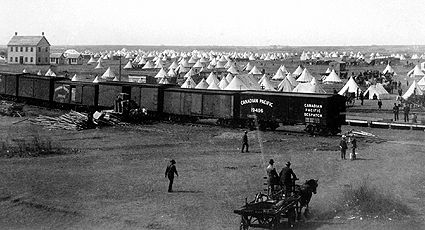
Thomas Douglas, 5th Earl of Selkirk, colonizer (born 20 June 1771 on St Mary's Isle, Scotland; died 8 April 1820 in Pau, France). The youngest son in a large family, he unexpectedly became next in line to the title and upon his father's death (1799) sought to make his mark in the world. He found his place in the sponsorship of displaced Highlanders to settlements in British North America. In 1803 he settled 800 Highlanders on land he had purchased in Prince Edward Island, and in 1804 he established a settlement at Baldoon, Upper Canada. Selkirk's motives were a complex mixture of humanitarianism, land improvement and personal ambition. In 1806, he was elected as one of the 16 Scottish peers to the House of Lords and in 1807 was appointed lord lieutenant of Kirkcudbright.
Less than successful in politics and public life, Selkirk resumed his interest in settlement and in 1811 — he and his family having bought into the Hudson's Bay Company (HBC) — received from the company a large land grant of Assiniboia, in what is now Manitoba. An advance party, sent under Miles Macdonell in 1811, established Red River Colony in 1812. Conflict with the North West Company (NWC) and local Métis led to the colony's dispersal in 1815, and Selkirk arrived in Canada to supervise in person.
On his way to Red River in 1816 with a party of disbanded Swiss soldiers, Selkirk learned of the deaths of Governor Robert Semple and a number of colonists at Seven Oaks; accordingly he occupied the NWC depot at Fort William. Embroiled in complex litigation with the NWC and Canadian opponents of his colony, Selkirk visited Red River in 1817 before returning to Canada to battle his opponents in the courts. Selkirk regarded as a stain upon his honour his inability to convince either the Canadian authorities or the British government that the western disputes resulted from a conspiracy against him and the HBC. Ill with consumption, he departed for Britain in 1818. Deteriorating health inhibited his efforts at vindication and he died in France, on his way to a more congenial climate.
Although his ventures were expensive failures in his lifetime, Selkirk is best remembered as an earnest and articulate advocate of the right of cultural minorities to preserve their way of life through resettlement in British North America, and as an early opponent of efforts by the British government to restrict emigration as a way of improving living standards.

 Share on Facebook
Share on Facebook Share on X
Share on X Share by Email
Share by Email Share on Google Classroom
Share on Google Classroom


